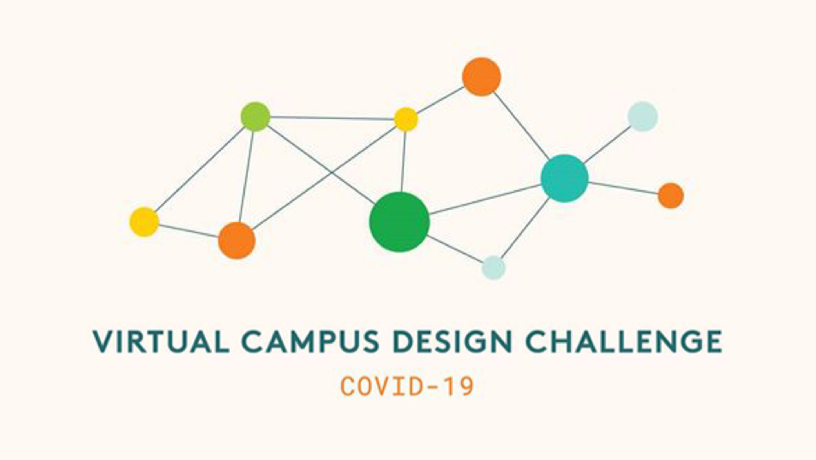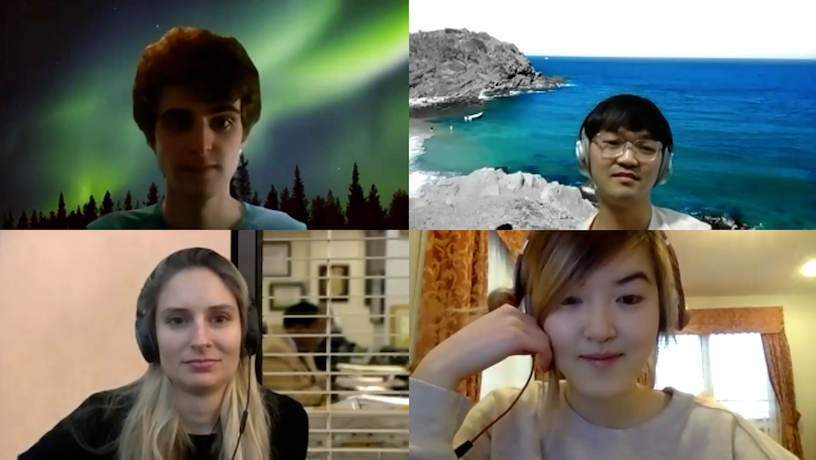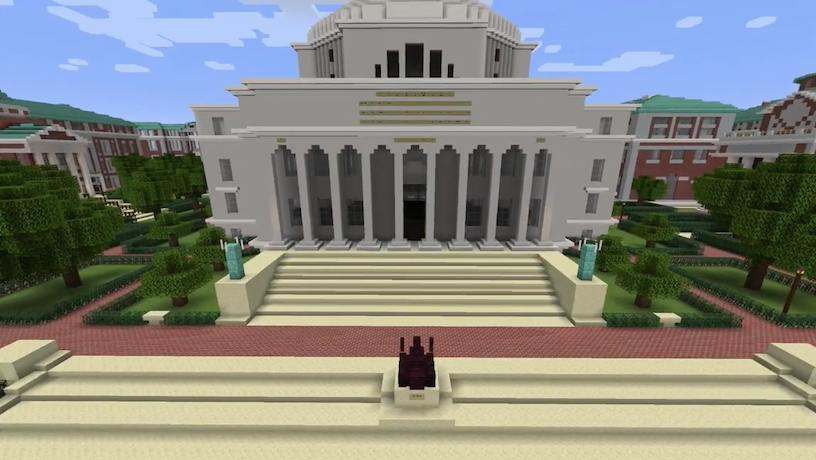Emoting while Remoting
Students team up on design challenges to address challenges of remote living

As Columbia Engineers join forces with clinicians and health care workers at Columbia University Irving Medical Center and hospitals across the metropolitan region, students are teaming up remotely through design challenges to manage the new world we’re now living in. Some of the challenges, like the DIY Ventilator Challenge, are focused on finding specific solutions for medical care, while others are targeted at bringing students together to have fun, socialize, and connect while learning new skills.
While students have been adept at taking classes and doing homework online, many have felt disconnected and alone and eager to find a way--while now living remotely--to rebuild the sense of community they had had on campus. A group of juniors at the Engineering School and the College--Gitika Bose (SEAS ’21), Tejit Pabari (SEAS ’21), Archit Choudhury (GS ’21), Karen Lin (CC ’21), Sharon Jin (SEAS ’21)--got together over Zoom and decided to build a website that could serve as a portal for the many aspects of campus life they deeply missed, from board games and “hangouts” in a virtual Lerner Center to updates on the COVID 19 virus and resources for international students.
Their timing was perfect: Lydia Chilton and Eugene Wu, assistant professors of computer science, were in the process of developing a virtual design challenge for undergraduates from Engineering, the College, General Studies, and Barnard to work on ways to address the challenges of remote living and the need for community.
The student group, several of whom are in Chllton’s User Interface Design Class, came to Chilton for guidance and started building Columbia Virtual Campus to recreate a sense of community, purpose, and normalcy for students that are now scattered around the world. The website provides relevant resources and a platform to support students and clubs at Columbia to share events and activities. In its first month of operation, the website has gained more than 400 users along with over 25 new developers and organizers to help grow and broaden the community. Recent and upcoming events include a “Little Mermaid” singalong, Netflix watch parties, board game evenings, and student stand-up comedy nights.
Chilton and Wu ran their design challenge over the weekend of April 4 with the goal to engage more students in recreating their favorite aspects of campus life and integrating them into the new website. “We told everyone that the idea is for this to become your campus away from campus, as we come together virtually,” says Chilton. “The website is the perfect portal for all their activities.”
Students used Minecraft to build an actual “virtual” campus.
More than 100 students participated in the weekend design challenge and many are continuing to refine their projects as the website grows. The four winning teams, which each received $500, were:
- Biggest Impact
- Sentiment, a text messaging service that sends out daily texts to prompt users to check in with themselves and their loved ones. Founders Julia Sheth and Madeline Placik, both SEAS ’20, say they made Sentiment to strengthen emotional connections and build community in times of isolation, so “you can emote while you’re remote.” They’ve signed up more than 120 members so far and have received lots of positive feedback. They are now building out a website to create an online Sentiment community to expand their mobile community. They hope that the website will be a place “where people can respond to daily prompts and polls to check in with themselves and understand how the rest of the Sentiment community is feeling.”
- Best Focused Impact
- Care from Home, an app for caregivers without medical training to help someone recover from COVID 19. Founder: Cassidy Gabriel, CC ’21
- Most Fun
- Columbia@Home, an augmented reality overlay of Columbia campus scenes via a Snapchat lens. Founder: Lindsey Weiskopf, Barnard ’22
- Best Design Insight
- LionClub, an app for maintaining your motivation by holding yourself accountable to your friends. Founders: Maggie Fei CC ’20, Lily He SEAS ’20, and Michelle Liu SEAS ’20
As part of the design challenge, students met over Zoom with several mentors and judges, who included:
- Sarah Morrison Smith, a Roman Family Teaching and Research Fellow at Barnard with a focus on human-centered computing;
- Yohana Tesfamariam Tekeste, an experienced staff associate who is interested in the development of various informative tools to help agricultural stakeholders in their decision making processes;
- Alex Weintraub, a core lecturer for art humanities with expertise in art history and archaeology;
- Harry West, a professor of practice in mechanical engineering and industrial engineering and operations research, who is interested in the intersection of design, data, and behavior change with a focus on developing new ways to reduce consumption; and
- Eugene Wu, assistant professor of computer science, who develops systems and algorithms for modern interactive data analysis.
“We saw 13 interesting ideas revealing the ingenuity of Columbia students and also their concerns during this time of social distancing,” says West. Several teams recreated virtually the Columbia campus--visually or even aurally--as a place to meet with new people, concentrate on work, play with friends, or show the campus off to admitted students. We were reminded of the importance of place in our community: our campus is not just a physical space, it is also a cognitive, social, and emotional space.”

Lydia Chilton and students met over Zoom for the design challenge.

A 3D version of the Low Library.
One of the 16 competing teams, LionCraft, seems to have already won the popular vote. Four students--Evan Tilley SEAS ’22, Cindy Espinosa Barnard ’22, Hector Liang GS ’21, and Annie Sui CC ’22--worked with Chilton as their mentor to build an actual “virtual” campus in Minecraft, a game in which players can build a 3D world with blocks. All you need is a computer--you can work to create a world with others from anywhere around the globe.
The team invited all members of the Columbia community to play and help build, including incoming first years. LionCraft is even offering tours to admitted and prospective students on the virtual campus.
The community is growing fast: so far more than 500 people have signed up to participate, and over 400 have joined the LionCraft server. Alumni have also taken interest in the project--many have joined the server, and many others have seen their children having fun on LionCraft while “walking” around the virtual Columbia campus.
The entire campus exterior, including Barnard and parts of the surrounding city, has now been built and students have moved on to filling up the interiors of their favorite buildings, from dorms to Mudd, Joe’s Coffee, and Butler Library. One student even built the halal food truck always parked on Broadway at the 116th Street entrance to Morningside Campus.
“Meeting people you haven’t met before is a really nice way to stay connected,” says Tilley, who has wanted to create a project of this nature since his first year at Columbia. “It’s a fun, interactive way to feel that, even though we’re spread out all over the world, we’re all on campus together.”
“This was a great design challenge with a lot of really creative collaborations,” says Chilton, who works in human-computer interaction with a focus on computational design. “It was instantly immersive and that’s where the magic happened – students got together and were totally motivated to get things done. And they learned that, no matter the outcome, the most important thing is to keep building your idea, to get a prototype in front of people who can benefit from it--real users--and listen to their feedback. You never know what will catch on.”
